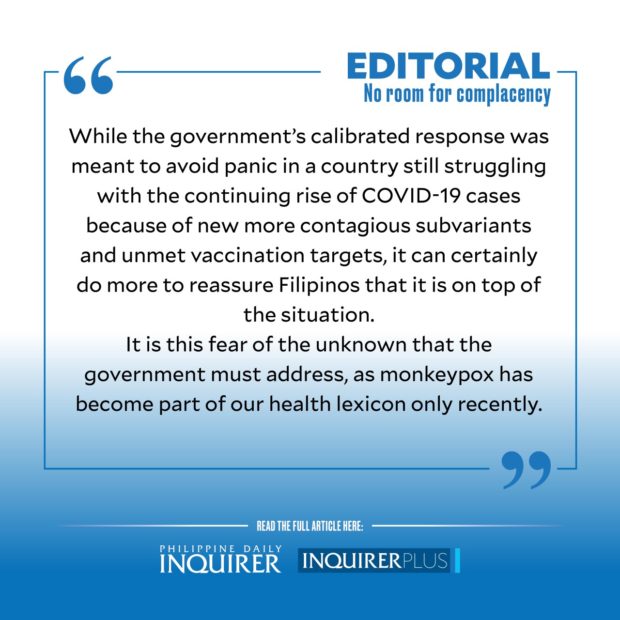No room for complacency
The World Health Organization (WHO) last week declared a global health emergency on monkeypox, as confirmed cases totaled at least 20,300 in some 70 countries. The announcement was designed to trigger a coordinated international response and unlock funding on vaccines and treatments. So far, the Philippines has recorded only one case, who has since recovered and is isolating at home, while his close contacts have been ordered to quarantine as well.
Amid fears that monkeypox could start another pandemic, President Marcos Jr. on Monday assured Filipinos that the virus, being less transmissible, is “not as scary as COVID-19,” though he called on the public to continue observing health protocols to curb its spread. The Department of Health (DOH) meanwhile said it was “not necessary” to close the country’s borders and discontinue trade.
While the government’s calibrated response was meant to avoid panic in a country still struggling with the continuing rise of COVID-19 cases because of new, more contagious subvariants and unmet vaccination targets, it can certainly do more to reassure Filipinos that it is on top of the situation.
It is this fear of the unknown that the government must address, as monkeypox has become part of our health lexicon only recently, although the first case was identified in 1970 in Congo. Distinct from smallpox and chickenpox, the monkeypox virus naturally lodges in wild animals but has crossed over to humans, probably as a result of direct contact with an infected animal’s body fluids from a lesion or wound. The viral disease has caused global concern when rising cases were detected among individuals who have had no travel history in Central and Western Africa where monkeypox is endemic.
Unlike COVID-19, the monkeypox virus is not airborne, but can be transmitted via contact with the infected individual’s skin lesions and bodily fluids, large respiratory droplets, and contaminated bedding. Clinically, it presents as a fever with swollen lymph nodes, intense headache, back pains and muscle aches, and extreme fatigue. The rash or skin eruptions—usually on the face and extremities rather than the trunk—come one to three days after the fever. Also affected are the oral mucous membranes, the genitals, and the eyes. The rash develops into papules (slightly raised firm lesions) and pustules (lesions filled with yellowish fluid), before forming a crust, drying up, and falling off. While self-limiting, monkeypox can be fatal to immunocompromised individuals, and can lead to encephalitis, sepsis, and other complications.
So far, the DOH has ordered a 14- to 21-day quarantine for infected individuals, and has been coordinating with other countries and medical groups for donations of smallpox vaccines, the current preventive treatment for the virus. Meanwhile, arrivals from places with monkeypox cases are being asked to roll up their sleeves for the telltale rash or pustules.
While monkeypox transmission may not be a cause for alarm just yet, the Quezon City local government unit (LGU) for one has come up with several initiatives to meet the threat head on. Already, it has designated isolation rooms in several government hospitals for suspected, probable, and confirmed cases; and organized a quick response team to ensure that personal protective equipment and other logistical needs for contact tracing are sufficient. It’s a proactive stance that other LGUs and the DOH would do well to emulate.
The DOH could also expand and make accessible its information campaign on the virus that has so far been described—wrongly—as being transmitted through male-to-male intimate contact. Already, a TV host had to apologize for his tweet saying as much, and rightly so, as being considered a sexually transmitted disease could stigmatize monkeypox sufferers and lead them to hide their affliction.
While the DOH on its website has complemented its thorough discussion of the viral disease with illustrative graphs, people still need to go online and scan a QR code to download attachments on the subject. A more convenient, far-reaching, and cost-effective route, aside from media interviews and public service announcements, is to post information on the virus inside transport hubs where crowds congregate, including inside buses and the carriages of the rail system, where people can while away their time reading potentially life-saving tips. Learning from the challenges of the COVID-19 pandemic, the DOH too can start its inventory of isolation facilities and cold storage equipment for smallpox vaccines, and review its vaccination protocols for possible ways to break down vaccine resistance.
Are we overreacting and anticipating what may never come to pass? But then who can blame us? The health sector being perennially overlooked—with a health secretary still to be named—there simply isn’t any room for complacency.
For more news about the novel coronavirus click here.
What you need to know about Coronavirus.
For more information on COVID-19, call the DOH Hotline: (02) 86517800 local 1149/1150.
The Inquirer Foundation supports our healthcare frontliners and is still accepting cash donations to be deposited at Banco de Oro (BDO) current account #007960018860 or donate through PayMaya using this link.

















